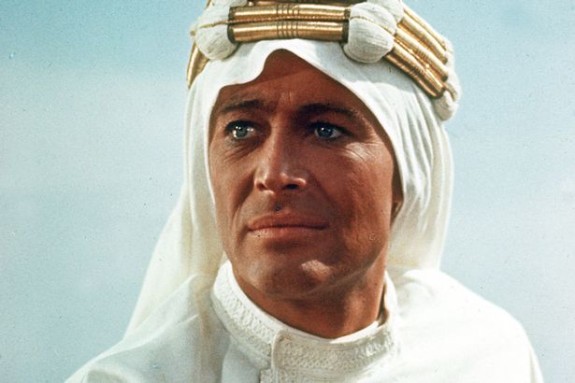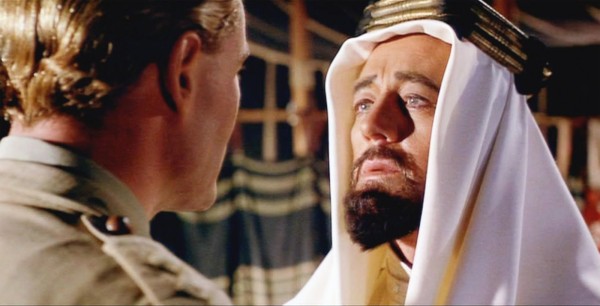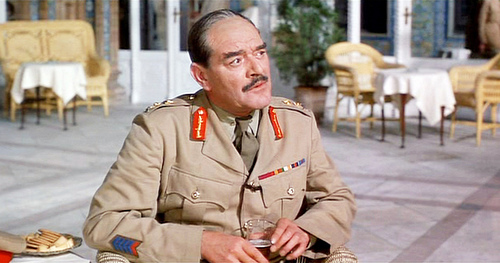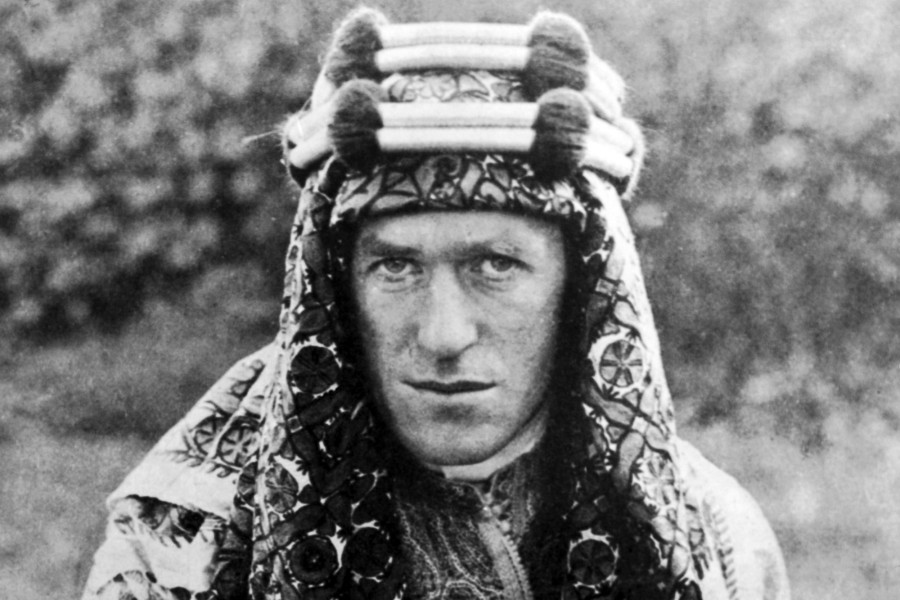I normally don’t watch a movie, however good, more than once. But when I read that Peter O’Toole had died, I decided to revisit Lawrence of Arabia, David Lean’s three-hour epic in which O’Toole played the lead role.

The recipient of seven Academy Awards, including best picture, Lawrence of Arabia is one of those rare films that embeds itself in your mind.
It unfolds against the backdrop of spectacular desert scenery, compliments of the Hashemite Kingdom of Jordan. Its cast of characters, from T.E. Lawrence on down, is vivid. Its story line, the Arab quest for independence as the decrepit Ottoman Empire totters, is spellbinding.
Combining these elements, Lean crafted an unusually compelling film that explores the vagaries of politics and personal relationships. Lean originally wanted Marlon Brando to play Lawrence, but he was busy with another project and declined. On the advice of a friend, Lean chose O’Toole, a fairly unknown actor. It was the role of a lifetime and O’Toole rose to the occasion in his portrayal of Thomas Edward Lawrence.
Lawrence was an Oxford University-trained British archeologist who, perhaps, was destined to pass into the realm of legend. Having worked on digs in the Middle East, he was familiar with the region, certainly more so than most British soldiers when World War I erupted. And since he was not adversely predisposed toward Arabs, like so many of his fellow officers, he was in a position to establish important bonds with the leaders of the Arab Revolt, the uprising that helped break the centuries-long Ottoman grip on the Middle East. The Ottoman loss of empire, in turn, led to the emergence of new nation states in the Mideast.
So Lawrence was not just another adventurer whom historians consigned to footnotes. He had a real impact on events. He was one of the architects of the modern Middle East as we know it today.
Lawrence of Arabia hews closely to that script.
It starts as an unidentified motorcyclist wearing goggles roars down a quiet country road in Britain. Trying to avoid two cyclists, he veers off the road and is sent flying into bushes. The accident kills Lawrence.
The film cuts to his funeral, where a mourner says,”He was the most extraordinary man I ever knew.”
In the next scene, in Cairo, a British army colonel belittles the importance of the fighting in the Middle East, claiming it is “a storm in a tea cup,” little more than a sideshow when compared to the gargantuan battles raging in Europe.
Dryden (Claude Raines), a seasoned Middle East hand attached to the Arab Bureau, begs to differ with that curt appraisal. When Dryden recommends that Lawrence, an obscure and seemingly effete officer, be sent to the Middle East to “appreciate the situation,” an arrogant general sputters. “I can’t imagine why Lawrence would be of use in Arabia. (He’s) the kind of creature I can’t stand.”
At this juncture, with Maurice Jarre’s stirring musical score swelling, the film shifts to the majestic sand dunes of what is now Jordan. Lawrence and an Arab guide, each riding camel, stop at a well to quench their thirst. The Arab is shot and killed by a stranger in the distance, Sherif Ali (Omar Sharif), who explains that only members of his own tribe can use this well.
In response, Lawrence says that, in the absence of Arab unity, the Arabs will always be a “cruel, silly and barbarous” people. It’s one of the leitmotifs of the movie.
Prince Faisal (Alec Guinness), the film’s central Arab figure, is first glimpsed as his camp in the desert is attacked by enemy aircraft. Talking to Lawrence, he expresses doubt that British and Arab strategic interests are aligned.

Back in Cairo, Lawrence diverges from the view of the British general staff that Arab insurrectionists should fight the Ottomans in regular warfare. The Arabs, he advises, should conduct a guerrilla war against the Turks.
His advice accepted, Lawrence leads a rag-tag band of Arab fighters across the scorching and inhospitable desert to attack the Ottoman-held port of Aqaba from the rear. Aqaba is important because it commands the Ottoman route to the Suez Canal, a prime British asset. Sherif Ali claims his plan will not work, but Lawrence perseveres, gaining his admiration and respect.
The camera pans on Lawrence as he sits on a camel facing an orange-gold sunset over the Red Sea. It’s a remarkable scene, emblematic of the beauty of the area.
Lawrence arrives in Cairo after an arduous trek across the treacherous Sinai Peninsula. He is dressed in a white Arab robe, having gone “native.” General Edmund Allenby (Jack Hawkins), the commander of British forces in the Middle East, is astounded by the news that Aqaba has been captured. “A brilliant piece of soldiering,” says Allenby, who proceeds to promote Lawrence to the rank of major.
Being pro-Arab, Lawrence says, “Arabia is for the Arabs now, or that’s what I told them.” Allenby assures him that Britain has “no ambitions” in the Mideast.

Dispatched yet again to the front, Lawrence leads Arab raiding parties to blow up Turkish trains. During a break, Lawrence tells an American journalist covering him that the Arabs will gain their freedom. “I’m going to give it to them,” he boasts in his typically soft-spoken manner.
But during another interlude in Cairo, Lawrence, much to his surprise and dismay, learns about the “treaty.” By the terms of the Sykes-Picot Treaty, signed by Britain and France in 1916, the allies will split the liberated areas wrested from the Ottomans among themselves.
What a betrayal.
From that point onward, Lawrence of Arabia loses some of its dramatic momentum. The die has been cast, politically speaking, and Lawrence can do nothing about it.
O’Toole portrays Lawrence with admirable restraint, bringing a sense of quiet authority and self-confidence to the role. The British actors who play British soldiers and officials, particularly Hawkins and Raines, are first-rate.
More than 50 years after its release, Lawrence of Arabia still stirs the emotions. It’s demonstrably one of the greatest movies of the 20th century, dealing with Middle Eastern topics that still rivet the world.
